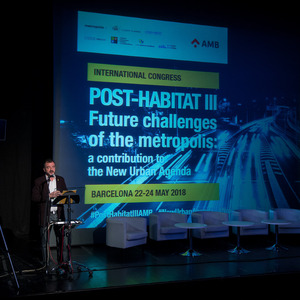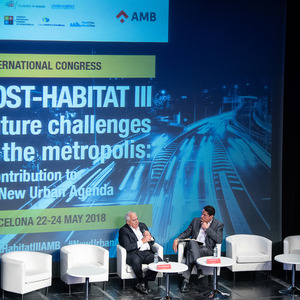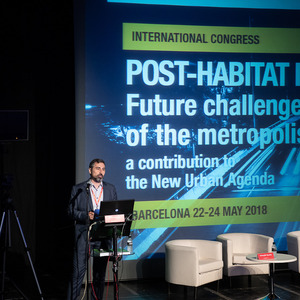Thirty global metropolises and more than two-hundred attendees meet to discuss the challenges facing the cities of the future
| Subject: Urban Planning
The key items on the metropolitan agenda, which were listed in the roadmap presented, can be classified into four areas (sustainability, urban planning, social cohesion and economic development) and in two broad-based dimensions: public participation and metropolitan governance.
The Metropolis World Congress was held on Tuesday 22 and Wednesday 23 May, bringing together almost 30 international urban conurbations and over 200 attendees, including international experts, metropolitan representatives, urban managers and experts in the sector, in the Francesca Bonnemaison Centre in Barcelona.
Also present was Ernesto Samper, former president of Colombia, who said that cities are demanding a voice in the world because they are home to the problems of the twenty-first century. He argued that they should be considered ‘city-states or regions' rather than mere municipalities.
Key items on the metropolitan agenda
The key items on the metropolitan agenda, which were listed in the roadmap presented, can be classified into four areas (sustainability, urban planning, social cohesion and economic development) and in two broad-based dimensions: public participation and metropolitan governance.
With regards to sustainability, challenges arising from climate change are emerging. These include rising sea levels and vulnerability to adverse weather conditions, mobility, the lack of natural resources and the issue of renewable energies.
For urban and metropolitan planning, the proposal involves establishing models for a compact metropolitan city that foster fairness and which mitigate economic imbalances, establishing cohesion and equality among citizens.
The third item is social cohesion, which requires the creation of spaces for coexistence that guarantee diversity and democratise public spaces, and for safety there to be guaranteed. Cohesion must be promoted by means of bottom-up policies: from the social fabric of neighbourhoods upwards to institutions and government bodies.
Finally, in terms of local development and economic competitiveness, it is necessary to obtain resources, raise the metropolitan brand's profile internationally to attract investments, adapt to economic changes and the rise in housing prices, and to fight against unemployment, guarantee security and mitigate the effects of global conflicts on urban economies.
The two road-based dimensions included in this institutional recognition are based on the need to integrate public participation and take it into consideration in metropolitan policies. Mechanisms for real participation are a useful tool for citizens to decide what form the administration at the closest level to their territory should take.
Annex: Habitat III in Quito
Habitat III , the United Nations Conference on Housing and Sustainable Urban Development, took place in Quito in October 2016. One of the central themes of this conference was the commitment to achieve inclusive, safe, long-lasting and sustainable human settlements and cities. The strategy for achieving all these commitments is called the New Urban Agenda.
These conferences take place every 20 years, and aim to enhance the global commitment to sustainable urban development, focusing on the implementation of the New Urban Agenda and placing cities and urban areas on the world map as key places for making decisions and implementing policies. Habitat I took place in Vancouver in 1976, and Habitat II was held in Istanbul in 1996.
Image gallery
Related documents
Related links
Where
















































